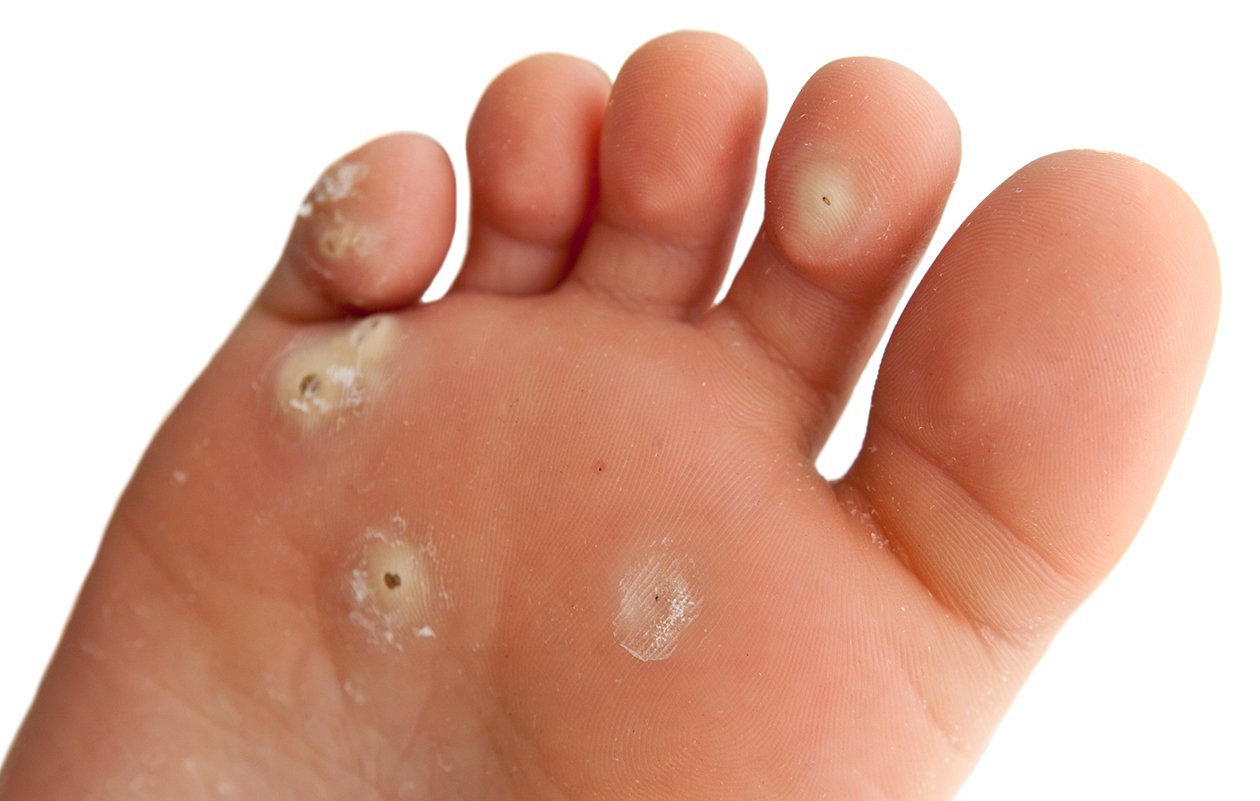
Verruca Infection & Treatments are very common, and we see them in our patients almost on a daily basis. They’re a pretty simple issue to deal with, but they can often become painful and hard to manage if not properly cared for.
There are lots of questions surrounding verrucas on feet, one of the most common being “Do I have a verruca or a corn?”. We’re here to give you the answers you need. So, if you want to know more about verruca infection and verruca treatment, read on!
What Are Verrcas ?
Verruca or verruca infections are a virus. It is caused by the Human Papillomavirus (HPV) and is highly contagious. Verrucas on feet are commonly spotted on the soles of the areas around one’s toes. These viruses thrive in moist environments and tend to cyclically be outbreak in children at the park (like hand, foot, and mouth disease). Verrucas tend to look kind of like cauliflowers, but then they flatten up because of pressure when they are on the soles of your feet.
Sometimes verrucas can be painless, but more often than not they are very uncomfortable and even painful to deal with. They can disappear overnightan or can be persistent for years on end.
Verruca Symptoms
It’s very easy to confuse verrucas on feet for other types of warts and corns. That’s why it’s important to know the distinct symptoms of verrucae (yes, that’s the plural of verruca!). This way you can identify them and give them the correct form of verruca treatment.
There are some key identifying factors when it comes to Verrucas which can help you single them out from all these other ailments:
- There’s a black dot in the center of the raised skin (in most cases)
- The “wart” is oddly cauliflower-shaped
- You feel a stinging “stepping-on-a-needle” type of pain when you apply pressure
- The lump is small and rough
- You may have multiple on your hands and around your mouth as well (in the case of Hand, Foot and Mouth Disease, or HFM for short, which is common in most children)
What Causes Verrucas on Feet?
Now that you know more about the Verruca infection, it’d do you good to understand where it comes from so you can prevent it from happening to you. Especially if you have children or young adults at home since they’re the most prone and the virus is extremely contagious.
Verrucas are caused by HPV. Verruca infections can spread from person to person via direct skin contact or even just contact with surfaces contaminated with the virus. You’re also more likely to get infected if your skin is damaged or wet, so swimming pools and communal showers tend to be a breeding ground for verruca infections. Apart from infecting (or being infected by) others, you can even further infect yourself by touching unaffected areas of your body. The viral particles tend to spread when you scratch a verruca. As with most viruses, your chances of developing verruca infections runs high if you have a weak immune system.
Do I Have A Verruca or A Corn?
Most people tend to confuse Verrucas for Corns. It’s a very common problem seen by Podiatrists everywhere. A lot of times, patients come in after “mistreatment” caused by the confusion. When you can’t tell if it’s a verruca or a corn, it’s probably best to see a medical professional (why not book an appointment with Bucks Foot Clinic?) before you treat it at home. The wrong treatment for the wrong lesion can sometimes even lead to more serious problems. So it’s best to know how to SPOT the difference between these spots.
Since you already know how you can tell if it’s a verruca on your feet, we won’t get into too much detail. In fact, we have an article specifically for this question alone. So, if you want to know if you’re dealing with a verruca or a corn, read this article of ours. It’ll give you better insight into properly identifying the differences between the two so you can tell if you’re dealing with a verruca or a corn with ease.
Verruca Treatment
Now that you know a lot more about verrucas on feet and what causes them, you’d probably want to know how to go about verruca treatment.
There are many ways you can go about treating verrucas on your feet. Though they normally go away with time, if you find yourself plagued with verrucas on your feet and they’re either painful or just an eyesore, here’s a few treatments:
1.Home Remedies:
- A great home remedy is taking a piece of banana skin and cutting it to be the same size as the verruca on your feet. Then, go ahead and place the piece of banana skin on the verruca and secure it with a plaster. Do this for about two weeks, every night before bed.
- Garlic is an all-round cure-all and is generally just really good for your health. You can use garlic to treat your verruca as well. Take a piece of garlic and put it over your verruca infection and secure it with a plaster. If you do this daily for a month, your verruca should go away.
- A study was done in which it was proven that duct tape surprisingly helps get rid of verrucas. Take a piece of duct tape and cover your verruca with it, and it should go away in a few weeks.
2.Medication:
- There are many creams, medicated plasters, and gels that you can use to aid the treatment of your verruca. Most of these are readily available as over the counter products, so you can get them at your local pharmacy.
- Salicylic acid is the key ingredient in all of these products and this is what actually treats your verruca. It helps soften the verruca significantly.
- Never use salicylic acid products on your face because that can lead to some really bad scarring. Also, if you have pre-existing medical conditions like diabetes, consult your doctor before using these products.
3.Cryotherapy:
Cryotherapy is a very effective way to remove your verruca. It is the process in which your verruca is frozen with liquid nitrogen, which makes it fall off. If you’re interested in cryotherapy, please visit a podiatrist and never try to do this on your own. It can lead to scarring and is typically also mildly painful, so it’s not a great option for children and people who are sensitive to pain.
4.Check In With Your Podiatrist:
The best way to treat anything related to your feet is by visiting a podiatrist. They are experts at all things foot-related and will be able to treat your verruca with ease and painlessly. When you visit a podiatrist, they will most likely use SWIFT Machine Treatment to get rid of your verruca. SWIFT is a very quick and efficient way to treat verrucas, it’s in the name itself! SWIFT uses microwave energy for verruca removal. To learn more about what you can expect from SWIFT treatment, read our article on this topic!
Conclusion
If you think you’re dealing with verrucas on your feet, don’t hesitate to seek help. Instead of suffering the soreness and the possibility of recurrence, visit a Podiatrist to help you deal with it permanently.
At Bucksfoot Clinic, we offer the best podiatric services. Contact us to book an appointment!
Please call us on 0800 107 3290 / 077 99 122 099 Or contact us now
